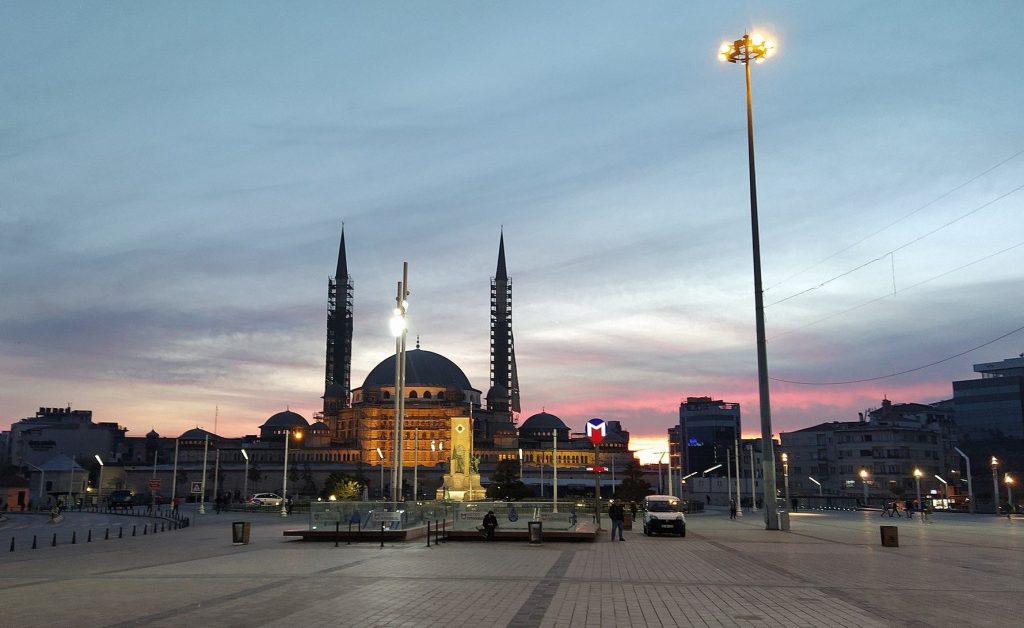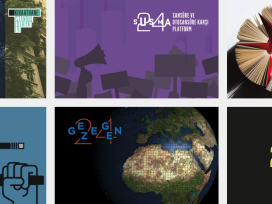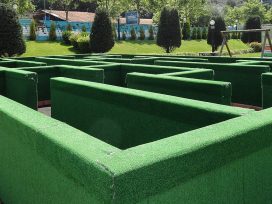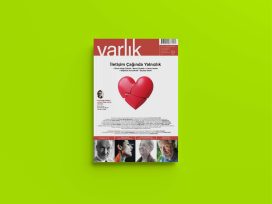On 17 May 2020, soon after breaking his Ramadan fast in Turkey’s capital Ankara, 34-year-old Serkan Kantık left his home to put out the bin. Wearing pyjamas, he was crossing the street when two brown-shirted men approached him. A Covid-19 curfew was in place, and the men introduced themselves as bekçi, a word that translates as ‘watchmen’. They demanded to see ID. Kantık is an ex-commando, who suffered hearing loss after a mine exploded near his army base a decade ago. Not fully understanding the situation, Kantık said he was just putting out the bin. The bekçi sprayed him with pepper spray, beat him with truncheons and handcuffed him. When Kantık’s brother, who is 12 and has asthma, came downstairs with his parents, they were also sprayed and handcuffed. The Kantıks spent the night in jail.
That was on 17 May. Just six days later, in Istanbul, a teenager named Tahir Erten went through a similar ordeal. Having stepped out for a late-night smoke, a little after 11pm, he was approached by three brown-shirted men. He soon found himself on the ground in handcuffs, watching his family rush to his aid. The bekçi beat them harshly, bruising his father’s face and breaking his sister’s arm.
Between March and May 2020, dozens of violent incidents were reported at the hands of the bekçi, Turkey’s new auxiliary police force. Videos were posted almost daily on Facebook and Twitter, but pro-government media accused their victims of plotting against the state, branding them liars and traitors. None of the offending officers were disciplined. Instead, once lockdowns and curfews lifted on 2 June, parliament approved a bill that granted the ‘watchmen’ powers on a par with the police, including the right to use guns against civilians.

Taksim Square, Istanbul, during the COVID lockdown in April 2020. Author: Myrat / Source: Wikimedia Commons
The watchmen are not new to Turkey. News of the brownshirts’ return is triggering Turks of a certain age, who remember the last successful coup in 1980, in which bekçi were a feared handmaiden of the military. Re-introduced in 2016, their numbers have since grown dramatically. Their re-emergence as a visible force in Turkish society couldn’t have come at a more sensitive time – 12 September marks the 40th anniversary of the coup, in which the bekçi helped junta leaders arrest 650,000 citizens, killing 171 under torture.
In June, soon after the new bill passed into law, bekçi started shooting citizens in the foot and from behind as they fled. Reports of 200,000 bekçi recruitments and footage of violent confrontations have released a flood of traumatic memories in a country that has experienced three military coups in its 98-year-long history.
The watchmen’s history is embedded in the region. The word bekçi is Arabic and describes a force whose history spans five centuries and covers the Byzantine and Ottoman empires. Before Turkey became a nation, bekçi trailed the streets of their imperial capital Istanbul at night, carrying lanterns, whistles and wooden sticks. They wore turbans and green coats made of animal skin and hit the pavement with their sticks at the changing of the hour. Evliya Çelebi’s Book of Travels claims 12,000 operated in Istanbul over the seventeenth century: they assisted births and weddings, cut wood in winter, washed corpses, dried carpets, functioned as water-carriers and real-estate agents, as well as waking Muslims for the predawn Ramadan meal by playing drums and reading poems. Bekçi also played a governmental role, announcing the Sultan’s proclamations to locals and assisting imams in house raids of adulterous women. In 1907, there were 1,370 nightwatchmen in Istanbul, 2.45 for each of Istanbul’s 543 neighbourhoods.
Nicknamed ‘the soul of the neighbourhood’ and ‘the eye of the state’, their wages were paid by locals who mostly trusted them, some even with their house keys. But sultans made use of the intelligence they gathered. In 1771, Abdul Hamid I honoured two bekçis with medals for their skill at imitating ‘scenes from neighbourhood life’ – play-acting different local figures they had observed. The bekçi’s role as intelligence-gatherers wielding little physical power made their existence unintelligible to some, and an article from 1895 proclaimed: ‘It’s childish and dangerous to trust the actions and tactics of these men who trail our streets like stray dogs.’
Under the reign of the Europeanising Young Turks, the sultanate began to crumble and its old traditions were removed from public life; by 1914, the bekçi began carrying pistols and fashioning modern uniforms. With Turkey becoming a modern republic, the bearded and fatherly remnant of the Ottoman Empire – compared by modern historians to British bobbies for their ‘community policing’ – was excised from Istanbul, as a modern force based on centralised French policing took over.
When Turkish novelist Orhan Kemal published Murtaza: King of His Duty in 1951, he portrayed its bekçi hero as a tragic figure policing streets with his chest thrown out and stomach pulled in, boasting of keeping the nation pure with his truncheon and desperately trying to enforce discipline in a society that abhors it. Since its publication, ‘Murtaza’ became a moniker for toothless state bureaucrats. In 2007, when a nationalist rector of Istanbul University called the literary giants Orhan Pamuk and Yaşar Kemal ‘traitors’, barring them from lecturing, newspapers nicknamed him ‘a bekçi Murtaza’.
But the watchmen’s return to public life is a recent phenomenon. Bekçi powers remained clipped until 1991, when they were assigned entirely to back-office roles. Once recruitments stopped, watchmen numbers eroded. But when the failed military coup in 2016 destroyed president Erdoğan’s trust in his security forces, the bekçi were summoned from the grave. In the ensuing overhaul, thousands of military and police officers were purged on suspected links to Fethullah Gülen, the exiled Islamist cleric accused of plotting the uprising. ‘When I lay down on my bed at night,’ Erdoğan reportedly told his interior minister in 2018, ‘I want to hear the whistle of bekçi. I want my people to know that someone awaits them on the street as they sleep.’
*
The president has his reasons for demanding nocturnal protection: he was asleep when a 25-person SWAT team travelling in three choppers targeted him during the failed coup. But there seems to be little else to justify the creation of an auxiliary police force. Since 2016 there has been no significant rise in urban crime rates. Still, weeks after Erdoğan’s paean to bekçi, the police department hired 30,000 watchmen. All but 70 were male, and their monthly wages of 4527 lira (£528) surpassed that paid to teachers and civil engineers. Bekçi training comprises a 41-day fast-track course in a police academy (normal cops receive two years of training). Results are far from impressive. On YouTube, a self-defence training channel called Tough Fight posted an instruction guide for bekçi after footage emerged of two watchmen failing to break up a small fight. In Izmir, Turkey’s most liberal town, five watchmen couldn’t handcuff a complying teenager, and when the youngster filming them offered to call the cops for assistance one bekçi bellowed: ‘We are the cops!’
A more serious concern is the bekçi’s links to government. The revival of watchmen exacerbates Erdoğan’s centralised powers under the presidential system introduced in 2017: there are few checks on his whims, and a loyalist militia, alongside a loyalist media, may intimidate young people who abhor authority. Feridun Bahşi, an opposition MP from IYI Party, claims bekçi application lists are drawn at local branches of the governing AKP. ‘They’re hiring bekçi to defend one-man rule,’ says an MP from Turkey’s main opposition party CHP. ‘They introduced watchmen not to ensure public safety, but to defend their regime.’ Bahşi wonders why the government doesn’t invest in CCTV cameras instead, and issues a stark warning: ‘Bekçi [are] already behaving like Iran’s morality police.’
To most Turks, this is a terrifying prospect. Increased street control via curfews and street patrols echoes measures instigated by military administrations in 1960, 1971 and 1980. Deniz Zeyrek, a seasoned Turkish journalist, recalled in a recent column: ‘While our house was raided and searched on the morning of 12 September 1980, I was shocked to see a bekçi guiding the sergeant and throwing off our mattresses. In that moment, the image of a “Benevolent Bekçi” was gone and replaced by the reality of a strait-laced, crowing, more of a royalist than the king Bekçi Murtaza.’ Zeyrek fears that ‘with the new bekçi Law, thousands of bekçi Murtaza will hit our streets.
The sight of bekçi Murtazas regulating life under curfews summons the fear of the violation of private space deeply embedded in Turkish memory. This anxiety’s centrality is well documented: a 2013 study by Eylem Delikanlı explores experiences of activists imprisoned by the 1980 junta and portrays a woman who locks herself into the bathroom while her children hide behind curtains. ‘I used to fear the night,’ she says, four decades after 12 September 1980: ‘To this day I jump when there is a late knock on the door.’ Delikanlı, a graduate of Columbia University’s oral history programme, interviews a father who remembers planting his son’s books in their back garden to save him. In those years Turkish soil became rich with works by Marx and Engels; in order to remain free, Turks learned how to hide their identity. Another interviewee remembers soldiers setting up a military base inside her living room to coordinate the operation to arrest her son. When night breezes gave her a chill, she had to ask their permission to take a shawl from the bedroom. ‘They aimed to inculcate fear in our minds,’ one activist told Delikanlı, ‘and hoped it would haunt us many years later.’ To a remarkable degree, this tactic worked.
*
Shortly after Black Lives Matter protests overtook the world in June 2020, Turgut Kazan, a lawyer who has devoted his life to defending Turkish journalists, pointed to George Floyd’s death as a cautionary tale for Turkey. ‘We should see where measures of oppression lead to, and how they make the whole world stand up against them,’ he said. The lawyer’s warning about the price states pay for unrestrained policing fell on deaf ears. In Antalya, a watchman shot a man from behind after he refused to show ID and tried to flee; the victim’s bowel had to be removed to save him. In Istanbul, a 52-year-old driver was beaten by two watchmen who accused him of ‘playing music too loudly’ in his van; the victim spent two days in intensive care. A man queuing outside a bakery was pepper-sprayed when he refused to show an ID. When he challenged the watchmen, he was shot. In a nightclub, two watchmen opened fire in the air after a DJ played ‘Bella Ciao’, an Italian revolutionary song they disliked.
For Turkey’s LGBTQI community the stakes are much higher: Turkey has the highest rate of murders of transgender people in Europe. In Antalya, a transgender woman was detained by watchmen who charged her with prostitution. In Mersin, a bekçi ordered a transgender woman to return home: ‘You can’t be here dressed like that.’ Pembe Hayat, another LGBTQI advocacy group, claims bekçi imposed a de facto curfew against transgender people in Ankara. In one case, they threatened a restaurant owner’s license if he continued serving transgender people.
‘Watchmen will be a tool in [the] government’s arsenal,’ says Soner Çağaptay, the author of The New Sultan: Erdoğan and the Crisis of Modern Turkey. ‘They’re creating a security force from scratch that has no institutional memory, whose professionalism lies in its loyalty to the president.’ Çağaptay lives in Washington, where he leads the Turkish Research Program at the Washington Institute for Near East Policy, but he grew up in Turkey at a time when the old bekçi force still existed. ‘If the new force was tied to the old one there’d be no problem,’ he says. ‘I think the only similarity between them will be the name. In terms of professionalism, training, loyalty and values, the new force will be Erdoğan’s own.’
Between 2016 and 2018, members of this new force made 20 million identity checks, arrested 36,832 people on the run, confiscating substantial quantities of drugs and illegal weapons. This resulted in a 13 per cent rise in the number of detained suspects, and a 36 per cent fall in automobile thefts. Some women interviewed in YouTube videos say they feel safe at night when a watchman defends the street; others complain of bekçi who ask for IDs and then follow them on Instagram.
But why give the bekçi new powers now, a year after losing municipal elections to the CHP, Turkey’s main opposition party? ‘Erdoğan is realising that his popularity is slipping,’ says Çağaptay. ‘His anti-elitist message was quite attractive when he first came to power, but nearly two decades later it doesn’t impress millennials who are born and raised under Erdoğan and who, when he blames Turkey’s former elites for problems, basically say, “Well, you’ve run Turkey for almost 20 years, why haven’t you fixed them?”’ Among the under-20s, support for government is weak: around 30 per cent against 70 per cent who favour the opposition. In the June 2019 elections, only three out of ten first-time voters favoured the government’s mayoral candidate for Istanbul.
The young have no memories of the 1980 coup, but they remember 2013’s Gezi Park protests, where millions marched in Turkish squares against authoritarianism – pitching tents, singing songs and occupying parks, much like the Occupy Wall Street movement. These young people remember how, when the police failed to contain Gezi, a new force emerged on the street to disperse them. I live a few minutes-walk from Gezi Park, and recall waking up to screams outside my apartment and witnessing, in horror, plain clothes men chasing gas-masked protesters with wooden sticks. In those years, EU-inspired reforms in police legislation made excessive use of force difficult for cops; but for this new entity there was little accountability. The press quickly named them ‘men with sticks’, and the shock of a violent new force reclaiming the streets scared young people. Their marches soon came to an end. With the bekçi’s new powers, these tactics have become legalized.
‘The main reason the AKP lost Istanbul and the capital Ankara in the last elections was the economy, which was in recession in 2018,’ Çağaptay says. ‘It is back in recession in 2020 and the government knows that isn’t good news. Erdoğan so far relied on plurality or a slim majority, but now he’s realising that he’ll have to rely on a minority to control and oppress his opposition. That’s where the bekçi institution comes in. It’s basically another instrument of oppression of the opposition, especially because the government can no longer rely on plurality of support to continue its regime. It will increasingly be a minority-based autocratic rule.’
Turkish economist Timur Kuran coined the term ‘preference falsification’ to define the act of misrepresenting one’s views under perceived social pressures. In public, he argued, people can parrot the line of their rulers, then use the ballot-box to vote out the same politicians. Preference falsification, despite helping preserve widely disliked structures, has delivered blows to Turkey’s autocrats in the past. There was little rebellion against 1980s curfews and oppression, but in the first free elections in 1983, Turks voted against the junta’s favoured leader, picking the liberal centrist Turgut Özal in a landslide.
So bekçi may further dominate Turkey’s streets in the coming years. But unless they patrol voting booths and demolish democracy completely, they may be laying the paving stones of an uncalculated outcome in the 2023 elections, which will mark the fortieth anniversary of the greatest liberal victory in Turkish history.







